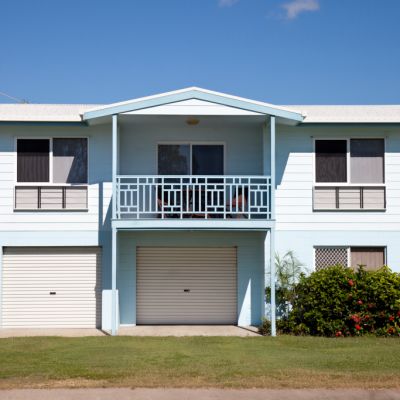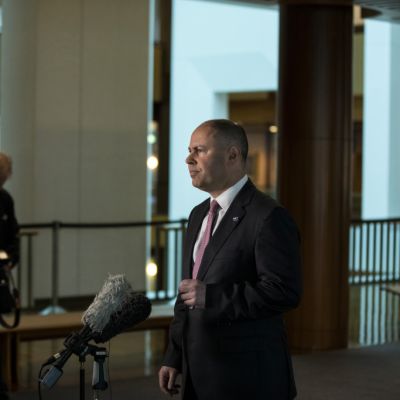Is buying property with a 5 per cent deposit risky during a recession?

Aussies hoping to saddle themselves with the maximum debt under the federal government’s First Home Loan Deposit Scheme have been warned to treat the property ladder leg-up with extreme caution amid a looming recession and growing job instability.
The recently revised scheme allows first-time property purchasers to snap up an abode with a deposit of just 5 per cent, with the government guaranteeing loans up to a certain price.
But while the loan, which was expanded to offer another 10,000 places on October 6 for new builds, eliminates the need for lender’s mortgage insurance, experts warn the initial savings could end up costing first-home buyers up to almost $80,000 more – causing an immense financial burden during a period of economic instability.
| Extended First Home Loan Deposit Scheme price caps | ||
| State/Territory | Capital city/regional centre | Rest of state |
| NSW | $950,000 | $600,000 |
| VIC | $850,000 | $550,000 |
| QLD | $650,000 | $500,000 |
| WA | $550,000 | $400,000 |
| SA | $550,000 | $400,000 |
| TAS | $550,000 | $400,000 |
| ACT | $600,000 | N/A |
| NT | $550,000 | N/A |
Source: Housing Minister and Assistant Treasurer
International insights manager at Finder Graham Cooke said first-home buyers needed to be very careful if they were borrowing more than 80 per cent of their home value, with one of the first dangers they faced being the increased costs.
“In most cases, you’ll end up paying back something like $1.70 for every $1 you save initially, so what looks like significant savings actually increases your long-term costs,” Mr Cooke said.
“Secondly, taking this option means you are starting your home loan journey with only 5 per cent of equity, a much smaller buffer to the threat of falling house prices and the potential of falling into negative equity.
“With the housing market very much in uncharted waters right now, this is a risk worth considering. However, if you plan to stay in your home in the long term [10-plus years] and you can afford the repayments [under a third of your earnings], then this might very well be an option that lowers the bottom rung of the ladder for some.”
Mr Cooke provided a cost example for first-home buyers using the NSW price cap of $700,000 with the average “big four” bank variable rate of 4.04 per cent.
| Deposit | Loan | Loan cost | Total cost | |
| Scenario 1 – with 5% | $35,000 | $665,000 | $1,148,460 | $1,183,460 |
| Scenario 2 – with 20% | $140,000 | $560,000 | $967,124 | $1,107,124 |
He explained that scenario one was with a 5 per cent deposit, while scenario two was with a 20 per cent deposit. According to the example, the lower deposit of 5 per cent would cost first-home buyers a whopping $76,000 more in the long run.
But while the warning to first-home buyers seeking to shoulder themselves with the maximum debt was clear, principal finance broker at Foster Ramsay Chris Foster-Ramsay said some first-home buyers were comfortable with the risk.
“We’re seeing a couple of things [right now] and the first thing would be demographics. A lot, if not all [of first-home buyers], sit in a millennial market and certainly they are textbook in terms of high-risk takers,” Mr Foster-Ramsay said.
“And they are quite happy in general terms to take on the maximum amount of debt, and that’s based off their belief that what we’re doing is the right thing to be doing.
“For example in Melbourne, property prices will hold in most cases if you buy in the right area and the individual couples are well educated and they have no issue going into the workforce.
“If you’re taking negative equity, most clients don’t see that as being an issue as they don’t believe it will be a problem. Now what that means in two or three or four years for first-home buyers who have never seen an economic recession, I don’t know.
“But we’re not even seeing the dial of the mitigated risk. These buyers say, ‘We want to buy a house in Melbourne and we want to get on the property ladder … we believe the property market will catch up, therefore [it’s worth the risk]’.”
Mr Foster-Ramsay said within his office, they were currently witnessing the highest number of first-home buyers in a long time and with slots limited in the First Home Loan Deposit Scheme, the situation for hungry home hunters was becoming competitive.
“The government is throwing money at them … the first question I get when a first-home buyer comes to me is, ‘Are you accredited to sort this 5 per cent deposit scheme out for me’ and there’s only 10,000 spots nationwide … everyone wants to get their slot.
“I think that there will certainly be an increased level of demand until Christmas and there’ll be a lot of people who will be disheartened.”
We recommend
We thought you might like
States
Capital Cities
Capital Cities - Rentals
Popular Areas
Allhomes
More










